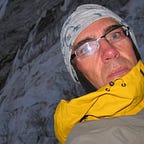Everest, Ego and Elevation
There are two reasons people climb Everest — to climb it, and to say they have climbed it. And often perhaps, a bit of both is in the mix.
To climb Everest in any fashion, there is a unique sense of being ‘on Everest’ and why even the best Himalayan climbers have been drawn to it, from Reinhold Messner to Ueli Steck. That they naturally gravitated to not using oxygen or following new or rarely ascended routes added the necessary challenge to the peak and made it worthwhile and rewarding.
As much as any climber could find high mountains and hard routes anywhere, it is Everest they often choose to return to.
Everest has an all consuming nature. ‘I’m going to Everest.’ I’m climbing Everest.’ I’m just back from Everest.’ No matter how hidden a person you are, climbing Everest is a public experience.
So the experience is shared, questioned, commented on and judged like no other peak. As much as the experience is very intense, very internal and very personal as you go higher, the broader experience is out there for all to see. And never more so than now with everything being shared on social media.
The current trend is about speed, the faster the better. Racing up the north side like Killian Jornet, or polishing off all three peaks in the Everest horseshoe in a season, combing ascents of Everest, Lhotse and Nuptse as Kenton Cool accomplished.
If you want to climb for the pure joy of climbing, Everest, unless by a new route on an obscure side, is probably not the best choice. Even if you can find obscurity, in a less common season or on a different route, you will still feel the invisible weight of Everest on your shoulders. Still, you get a good climbing day on Everest, cameras on you or not, and it could well be one of the best days of your life.
Ego
Do I want to climb this? Can I climb this? What will others think when I climb this?
The last question is where it gets complicated, when self-worth is suddenly played out against crowd-worthiness
As Stephen Venables states in his foreword to Rob Collister’s book, ‘- and don’t let any climber fool you that he or she does not have at least a streak of competitiveness -’.
Inherent in competition is being known for winning, whether it be two people on a boulder problem, a faster time up Everest or the claim to a route nobody else wants to repeat.
Yet climbing must be one of the harder activities to get known by. Even Messner stated in an interview withJim Clash for Forbes:
JC: What’s it like being famous?
RM: I am not so famous [laughs]. I’m known in a few countries like Italy, Austria, Germany, Switzerland and around the Alps. Some climbers in Beijing know my name, and some in America, but I am not really famous. It’s very relative, my fame.
Not too many sports have the very real down side of dying which undoubtably stops a few people. If you take the average percentage of deaths on Everest and compare it to the number of runners in the New York marathon, over 50 people would die every year — not odds most people would be comfortable with. Though there are certainly more sports out there now to quickly kill you than when Hemingway declared it was only Formula One racing, bullfighting and mountain climbing for the real man.
The danger comes, both to ourselves and others, when the motivation for climbing is only the desire to summit and talk about it. Not only do you miss the experience yourself, your consciousness is on the future, not the moment, perpetuating a deadly lack of focus.
Yet from a sport route at the local crag to the top of Everest, there is a competitive nature in climbing. And that drives our desire to compare. And how can we compare something no one has ever heard of? Everest makes that comparison easy, whether it be fair or not
There is of course the counter point that climbing, an often very personal experience, is best kept that way. And it can be, which can be rewarding too. They rest quietly in our memories as only ours. And perhaps for some that is the reward in itself.
Everest: when there is a good day on Everest, it doesn’t get any better.
Elevation — the higher we go the better we feel, or at least we hope so.
One of the things we are blessed with as climbers is the lack of rules. If we want to go climb something we can pretty much just do it. Perhaps you could do that bull fighting. No one will hardly let you near an F1 car, let alone out in it on a decent track for a race.
While there are the upcoming Olympic climbing events, that is such a small part of the spectrum, that the rest of us are left to determine our own paths, in known or unknown climbs. And known or unknown, it seems a bit of both is probably good for us. Balance is a good thing.
After all, climbing can be very hard work and at the odd moment a bit of recognition feels good. And then we can go forth and do some quiet conquering, with nary a word. That feels good too.
Stephen Venables after his oxygen free ascent and Robert Anderson, Everest South Col. A year later our team gathered in New York and when Stephen was asked what had changed, he thought for a moment and replied: ‘I haven’t bought lunch for a year.’ Photo: Ed Webster
